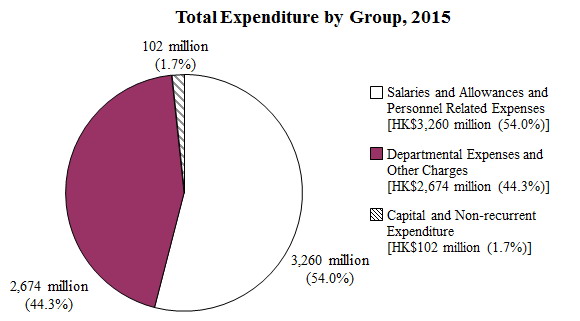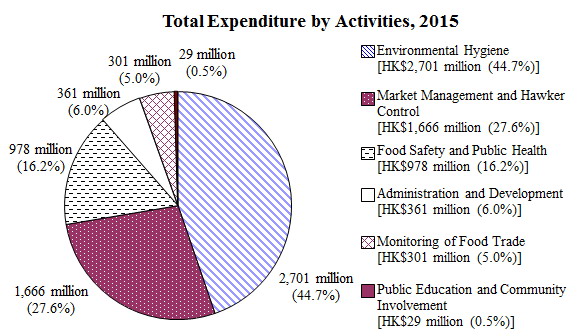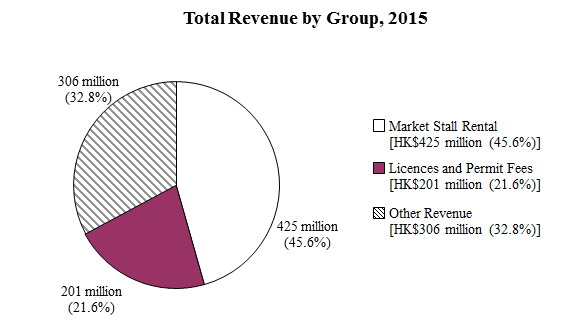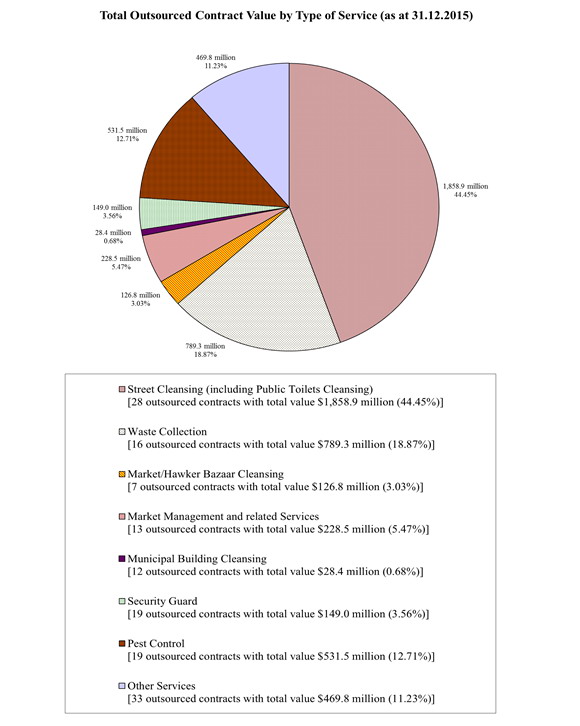The Administration and Development Branch provides various management and support services to the Department.
Grade Management
There are three major grades covering Health Inspectors, Hawker Control Officers and Foremen. Two grade managers, one for the Health Inspector grade and another for the Hawker Control Officer and Foreman grades, are responsible for staff matters involving manpower planning, career development, postings, promotion and training.
Health Inspectors are responsible for various duties concerning environmental hygiene and food safety, such as handling of environmental nuisance cases, hygiene inspections to food establishments, licensing, prosecution, meat inspection, cleansing services, outsourcing, pest control, hawker control, management of markets, cemeteries and crematoria, food control and health education.
Hawker Control Officers are responsible for controlling on-street hawking activities, managing hawker permitted places and taking law enforcement action against illegal hawking activities. They also play an important part in prosecuting people who have committed cleanliness offences, such as littering and spitting.
Foremen are mainly responsible for supervising the work of frontline staff in street cleansing, waste collection, pest control, cemeteries and crematoria and market management. They are also responsible for transport services and monitoring the performance of the Department's service contractors. Members of the grade also take legal action against cleanliness offenders.
Training
Training and development programmes are designed to enhance individual and organisational performance in providing quality service for the public. The programmes contribute to organisational effectiveness by providing leadership development opportunities, supporting departmental initiatives, bringing out the best of staff members for serving the public positively and professionally, heightening their awareness of occupational safety and health, and promoting a high standard of probity in the Department.
In addition to in-house trainers, experts in the field were invited to conduct training to enable staff members to keep abreast of the latest development in the relevant fields. While the majority of training programmes were held locally, staff members would also be nominated to attend overseas programmes.
During the year, the Department organised 963 classes, which were attended by 15,336 trainees, adding up to a total of 36,209 trainee-days. These included induction training programmes for a total of 864 new recruits to equip them with the necessary knowledge and skills to discharge their duties. In addition, the Department provided sponsorship to 10 staff members to pursue employment-related studies outside office hours, and 26 officers were placed in 17 training programmes outside Hong Kong, involving a total of 149 trainee-days.
Management Services
The Management Services, Survey and Statistics Section mainly provides management consultancy and statistical services to the Department. They help the management improve the delivery of public services, monitor the standard of performance and formulate policy in the provision of services and staffing. Ongoing consultancy services are provided to assist the Department in the implementation of recommendations of studies and technical advice is offered to help the Department conduct statistical surveys and analyse data.
Four management studies were completed during the year. In addition, a statistical survey to collect opinions on the Department's health education publications was conducted.
Financial Management



All matters relating to expenditure and procurement, including payment processing, financial advice and monitoring, are handled by the Finance and Supplies Division.
In 2015, the Department spent $6,036 million, including $3,260 million on salaries and allowances and personnel related expenses, $2,674 million on departmental expenses and other charges, and $102 million on capital and non-recurrent expenditure.
By activities, the majority of the expenditure ($2,701 million) was on environmental hygiene. This was followed by $1,666 million on market management and hawker control, $978 million on food safety and public health, $361 million on administration and development, $301 million on monitoring the food trade, and $29 million on public education and community involvement.
During the year, the Department received a revenue of $932 million. Most of the revenue came from the rental of stalls in public markets managed by the Department ($425 million) and from licence and permit fees ($201 million). Other sources included revenue from cemeteries and crematoria services ($107 million), court fines and statutory penalties ($55 million), slaughterhouse and other concessions ($84 million), meat examination ($22 million) and miscellaneous services ($38 million).
Capital Works
In the Government's 2015 Capital Works Resource Allocation Exercise, the five-year allocation on capital projects for food and environmental hygiene services is estimated at $4,690 million to meet expenditure on projects of the department.
Markets
Installation of a goods lift from ground floor to Upper 1/F at Kwun Chung Market is under planning for completion in 2017.
Refuse Collection Points
As part of the continuing efforts to improve Hong Kong's living environment, the Department is replacing temporary roadside refuse collection points (RCPs) with off-street facilities in enclosed buildings equipped with modern de-odourising installations. Reprovisioning of Tsuen Wan Transport Complex RCP under the West Rail Tsuen Wan West Station Development was completed in March 2015. Reprovisioning of Spring Garden Lane RCP at Sam Pan Street under Lee Tung Street/McGregor Street redevelopment project of Urban Renewal Authority was completed in June 2015. A new RCP at Site IJ4 in Kai Tak Development is under planning for completion in 2017. Reprovisioning of the Camp Street Temporary RCP within a residential development at Fuk Wa Street/Fuk Wing Street/Camp Street site in Sham Shui Po is under planning for completion in 2020.
Public Toilets
Under the Public Toilet Refurbishment/Improvement Programme, 18 projects were completed in 2015 and another 103 are in progress or being planned.
Cemeteries, Crematoria and Columbaria
Phase II of the reprovisioning of Cape Collinson Crematorium was completed in December 2015, with the commissioning of six additional cremators and one service hall.
The Government is exploring all feasible measures to increase the supply of public columbarium facilities. These include promoting district-based columbarium development scheme and providing additional niches in existing cemeteries and columbaria. Detailed design for the columbarium developments at Wong Nai Chung Road (expected to provide 855 niches in 2018) and Wo Hop Shek Cemetery Phase 1 Extension (expected to provide 44,000 niches in 2019), and detailed design and site investigation works for site formation and associated infrastructural works for development of columbarium, crematorium and related facilities at the Sandy Ridge Cemetery (expected to provide 200,000 niches by batches starting 2022) are in progress. Construction works for provision of columbarium facilities at Tsang Tsui (expected to provide 160,000 niches in 2019) will commence in 2016. The Administration will consult the relevant District Councils on other new projects for columbarium development.
Outsourcing of Services

Grand Total: 147 contracts with a total value of $4,182.2 million
By end 2015, 147 contracts valued at $4,182.2 million were in force for the provision of services by private contractors. The outsourcing policy is aimed at greater cost-effectiveness and flexibility in the delivery of services.
Examples of outsourcing services include: street cleansing, waste collection, mechanical street sweeping, mechanical gully cleansing, collection of recyclables, market management, cleansing, pest control and related services, rodent, mosquito and other pest control services, municipal services building cleansing, security guard services, animal carcass collection, cleansing and horticultural maintenance services for cemeteries and columbaria, tree risk assessment and arboricultural services, etc.
Measurable performance standards are written into contracts to ensure the quality of services provided. Labour protection and occupational safety clauses have also been included in tenders to safeguard the rights and promote the well-being of non-skilled workers. In addition to daily checking on the relevant records, surprise site inspections are conducted to ensure compliance with contract requirements by contractors at all times.
Complaints Management
The Complaints Management Section is responsible for formulating and reviewing policies on, and procedures for, handling all types of complaints. In 2015, the Department received 213,600 cases of service request and complaint from the public.
Quality Assurance
Continuous improvement is one of the priority tasks of the Department to ensure provision of quality services to the public.
The primary objective of the Quality Assurance Section is to monitor and improve service quality. To achieve this objective, the section conducts day-to-day regulatory inspections on services provided by the Department and service contractors. Recommendations are made for improvements to services with identified inadequacies in existing operational systems, procedures and guidelines. The section also recommends good performers for Quality Assurance Awards and Certificates of Meritorious Performance to give recognition to outstanding and hardworking frontline staff. In addition, the section investigates staff-related cases of dereliction of duty and employment-related complaints of service contractors in an independent, objective and fair manner. The section also conducts audit inspections and employment-related inspections to check service contractors' compliance with employment-related commitments.
Public Education and Publicity
Public education plays an important role in ensuring food safety and improving environmental hygiene. To this end, the Department organises publicity and educational programmes including talks, exhibitions and outreaching programmes to enhance the general public's awareness of these issues.
The Department operates a Health Education Exhibition and Resource Centre (the Centre) inside Kowloon Park to serve the public. It arranges group visits and guided tours for schools, elderly centres, children and youth centres, organisations for the disabled and the public. Talks and outreaching activities are also conducted regularly. In the Centre, exhibits on food hygiene were revamped with interactive screens for display of information on food safety. Visitors can also take and download photos with the newly installed 3D-illusion photo booth. During the year, the Centre attracted 111,287 visitors, and organised 1,072 talks-cum-activities for kindergartens, primary schools and secondary schools, 952 talks for elderly centres and 349 talks for the general public. The Mobile Education Centre (a publicity vehicle) also conducted 175 visits to schools, housing estates and public parks as part of the outreaching efforts in promoting health education.
To meet the targeted risk communication needs on food safety, there is also a dedicated Communication Resource Unit (CRU) under the Centre for Food Safety to serve the public and the food trade. Located at the Fa Yuen Street Municipal Services Building, the CRU maintains a rich collection of food safety related promotion resource materials. It has designated exhibition and information corners equipped with audio-visual facilities. The CRU also entertains requests for organised visits and food safety talks, and provides loan service of resource materials, exhibition boards and audio-visual resources for schools, community centres and other interested public. Apart from supporting initiatives and events on food safety risk communication, the CRU conducts regular education programmes throughout the year. In 2015, the CRU conducted 322 seminars, workshops and various types of publicity activities including roving exhibitions on food safety for the public and selected target groups, including food handlers, school children, the elderly and ethnic minorities.
During the year, the Department continued its publicity on environmental hygiene and food safety through Television and Radio Announcements in the Public Interest, social media such as Facebook and YouTube, mobile applications, banners, posters, pamphlets and leaflets. Anti-rodent and anti-mosquito campaigns were organised to solicit public support and participation in pest control. Support was also given to cleansing campaign/work by non-governmental organisations.





